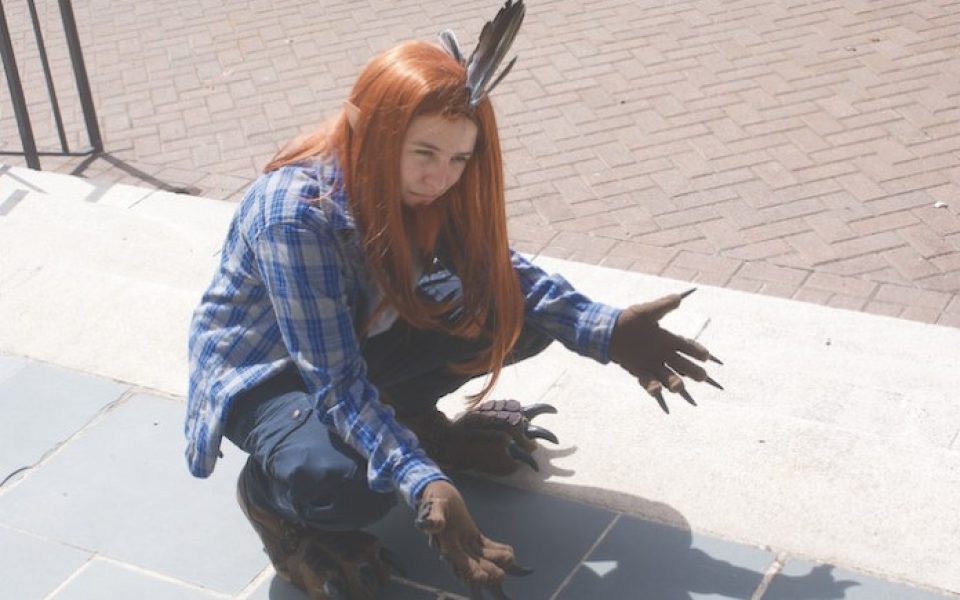A curly-haired young man holds out a foam staff with both hands, bracing himself to block a hit from a friend with a matching fake weapon. The resulting whack tears through the quiet of Guilford College’s weekend campus.
Isaac Cook, creator of most of the spongy armory, laughs while watching on. The combat comes as part of the warm-up for an “Amtgard tournament,” where passersby battle it out with swords and shields of PVC pipe, pool noodles and silver tape.
“You think it’d be weird being on a Quaker campus,” he says.
The weirdness continues during the college’s annual What the Hell?! Con, on the weekend of March 15. The event draws a loyal crowd of people like Cook, coming back for years for a chance to casually geek out. Everything remains student-run by members of the “Yachting Club” — a group that does anything but sail.
For at least a decade, the weekend has offered a nerd-centric reprieve with gaming sessions and a “Geek auction” for merchandise, including an e-sports chair, which donates proceeds to Extra Life — a charity that provides children in extended hospital stays with games.
“It’s free. It’s local,” Laura Simon says. “It’s not huge so you don’t get overwhelmed.”
Simon, one of the club’s designated “con organizers,” sits outside Dana Auditorium as people try out the weapons. Talons of resin and clay cover Simon’s hands and feet, and a mohawk of feather juts out of orange hair, recreating a character from a tabletop game that her predecessor led.
The turnover rate for leaders complicates the event’s exact history, according to Simon. Stories from past years float around the activity-filled rooms of Duke Memorial Hall.
While sitting around a tabletop game, a guest remembers their friend who met their wife when the weekend’s geek auction offered volunteer dance partners instead of merch, for a party later in the night. Another visitor counts the year as her eighth, returning again despite having never attended the college.
“We have a few things that stay the same,” Simon says, “but the people running it give it a different energy.”
For this year, Simon shifts the focus to the artists and content creators. Desks in the classrooms get stacked off to the side in lieu of miniature galleries and craft-fair booths.
“They do all this work,” she says, “and people take that for granted”
For Meesha DJ Walker, the event offers an unconventional studio space — a tarp and easel set up in the back row of a classroom, behind a display table. She paints gray strokes across a square canvas, while a palette with multicolored paint swatches rests in her left hand.
She pieces together an image of a cat in acrylic, hair by hair, while she plays soundtracks from television shows and an anime series from a speaker. With six years of experience doing WTH?!Con, Walker paints and converses the weekend away, vending while relaxed.
“The others are so big, and it’s all about business,” Walker says. “Plus, I can paint cats.”
In his fourth year at the convention, Marshall Lakes aims for his pop-culture inspired work to be “infectious,” .
“Nerd culture and the artist have never been separated,” Lakes says. “There is no nerd stuff to be involved in without the artist.”
Lakes’ corner of the con reflect his many “geekdoms,” as he calls them. He reaches into a suitcase full of watercolor pieces and ink drawings. He flips through pages to find a stack of off-white drawings and settles it on top of his table. Each of the 28 highlights different black influences — fictional or historical — for Black History Month.
He stops on Franklin from the Peanuts, pointing out the backlash creator Charles Schulz received over integrating Charlie Brown’s classroom. Another page reveals a detailed portrait of Harriet Tubman, a lifelike image in ink. He flips another sheet to show a realistic depiction of Katherine Johnson, one of the women who inspired Hidden Figures.
“I can express the whole of who I am,” Lakes says. “As an African-American and a nerd, I don’t have to separate it.”
Join the First Amendment Society, a membership that goes directly to funding TCB‘s newsroom.
We believe that reporting can save the world.
The TCB First Amendment Society recognizes the vital role of a free, unfettered press with a bundling of local experiences designed to build community, and unique engagements with our newsroom that will help you understand, and shape, local journalism’s critical role in uplifting the people in our cities.
All revenue goes directly into the newsroom as reporters’ salaries and freelance commissions.


Leave a Reply